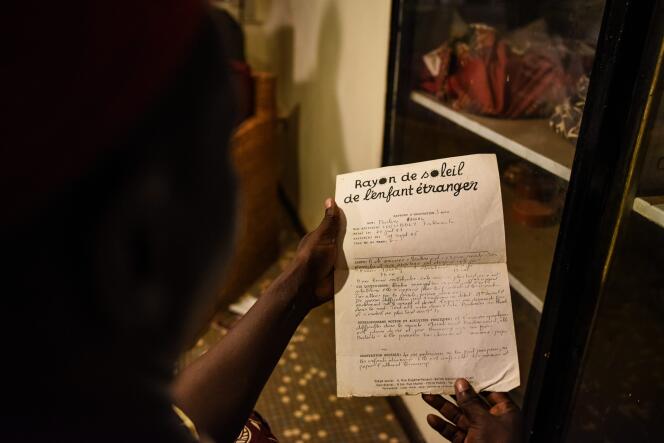
The news is “a start of relief”, after years spent alerting public opinion to the alleged excesses operated by the French adoption organization Rayon de soleil de l’enfant etranger (RDSEE) in several countries. At the end of January, Marie Marre, founder of the collective of French Adoptees from Mali and herself adopted through RDSEE in Bamako, discovers what she has been calling for since her discovery, in 2018, of many areas of he shadow surrounding its adoption: the Quai d’Orsay has repealed all of the authorizations issued to the organization.
Rayon de soleil, which could until now still carry out adoptions in five countries (Bulgaria, Chile, China, South Korea and India) on behalf of French couples, is now prohibited from acting as an intermediary. The ministerial decree confirming this, dated December 21, 2022, had gone under the radar. The reasons for this global arrest – a rare sanction – are not specified.
“The Ministry, in taking this decision, considered that the repeated attacks against RDSEE in certain media did not allow the OAA (organization authorized for adoption) to fully carry out its mission”, specified, for its part, the association on its website. On November 23, 2022, The world had published the results of five years of investigation into the presumed irregular adoptions carried out by this association, one of the most important French organizations responsible for the adoption of more than 7,000 children throughout the world since the end of the 1970s .
In Mali but also in the Central African Republic, Madagascar, Haiti, Peru and Romania, multiple sources ranging from the diplomatic archives of the State to French adoptees, biological parents and adoptive parents, including former officials of the association, questioned the probity of Rayon de soleil. All accused the association of having lied to adopt children who should not have been adopted. Contacted before the publication of the article, the Quai d’Orsay had then confirmed that there was “certainly had illicit practices” within the organization, before specifying that he now considered it as a “reliable interlocutor in the way he works today”.
The “hurdle” of limitation periods
Have new elements since enabled the Ministry to substantiate the information on the alleged illicit practices described by The world, thus justifying the global prohibition to exercise posed? When contacted, the Quai d’Orsay merely specified, as Rayon de soleil had done before it, that “repeated questioning” of the organism “for old facts” did not allow him to exercise normally.
Sylvie Cyprien, the president of RDSEE, specifies that the association intends to contest this decision, considering that “the reason chosen to justify the withdrawal of authorization does not enter the list of reasons legally provided for by the provisions of the code of social action and families, and undermines the presumption of innocence”.
Since the fall of 2021, justice has been interested in this case. On September 6, the Paris court called for the opening of an investigation for “concealment of fraud”, following a complaint, filed in June 2020 by nine French people adopted in Mali, against the association and his former correspondent in Bamako.
According to our information, a judge was recently appointed but, since then, the investigation has come up against the problem of prescription, the facts alleged by the plaintiffs dating back to the 1990s. However, most French adoptees do not discover the conditions of their adoption only when they become adults. “The State should legislate so that limitation periods are no longer obstacles for adoptees wishing to turn to justice”, recommends Marie Marre, herself a plaintiff in the Rayon de soleil case.
The 30-year-old hopes that the withdrawal of authorization posed by the Quai d’Orsay against the organization will be followed by state support for French people adopted through it and wishing to find their origins. Because for the time being, dozens of them are embarking on a solitary quest for truth in which there can be many dead ends without State aid, guarantor of the probity of the approved bodies at the time of these adoptions with sometimes contours obscure.
